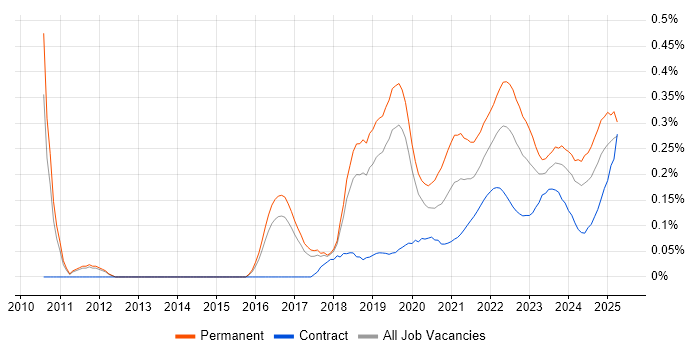Senior Cloud Engineer
UK > Work from Home
The median Senior Cloud Engineer salary for remote or hybrid work is £73,000 per year, according to job vacancies posted during the 6 months leading to 7 May 2025.
The table below provides salary benchmarking and summary statistics, comparing them to the same period in the previous two years.
|
|
6 months to
7 May 2025 |
Same period 2024 |
Same period 2023 |
| Rank |
372 |
483 |
570 |
| Rank change year-on-year |
+111 |
+87 |
+16 |
| Permanent jobs requiring a Senior Cloud Engineer |
60 |
100 |
92 |
| As % of all permanent jobs with a WFH option |
0.37% |
0.30% |
0.22% |
| As % of the Job Titles category |
0.40% |
0.31% |
0.23% |
| Number of salaries quoted |
32 |
87 |
64 |
| 10th Percentile |
£48,000 |
- |
£54,125 |
| 25th Percentile |
£60,625 |
£56,219 |
£56,625 |
| Median annual salary (50th Percentile) |
£73,000 |
£62,783 |
£68,515 |
| Median % change year-on-year |
+16.27% |
-8.37% |
-14.36% |
| 75th Percentile |
£83,000 |
£68,750 |
£88,125 |
| 90th Percentile |
£88,750 |
£94,250 |
£95,000 |
| UK median annual salary |
£76,000 |
£67,500 |
£75,000 |
| % change year-on-year |
+12.59% |
-10.00% |
-6.25% |
For comparison with the information above, the following table provides summary statistics for all permanent IT job vacancies with WFH or hybrid options. Most job vacancies include a discernible job title that can be normalized. As such, the figures in the second row provide an indication of the number of permanent jobs in our overall sample.
| Permanent vacancies in Work from Home with a recognized job title |
14,908 |
32,504 |
40,687 |
| % of permanent jobs with a recognized job title |
90.86% |
96.00% |
96.01% |
| Number of salaries quoted |
9,956 |
24,955 |
28,926 |
| 10th Percentile |
£30,000 |
£33,005 |
£36,679 |
| 25th Percentile |
£43,500 |
£42,500 |
£47,447 |
| Median annual salary (50th Percentile) |
£60,000 |
£56,000 |
£62,500 |
| Median % change year-on-year |
+7.14% |
-10.40% |
+4.17% |
| 75th Percentile |
£77,500 |
£75,000 |
£81,250 |
| 90th Percentile |
£100,000 |
£93,250 |
£100,000 |
| UK median annual salary |
£57,500 |
£52,550 |
£60,000 |
| % change year-on-year |
+9.42% |
-12.42% |
- |

